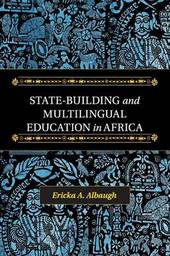
|
State-Building and Multilingual Education in Africa
Paperback / softback
Main Details
| Title |
State-Building and Multilingual Education in Africa
|
| Authors and Contributors |
By (author) Ericka A. Albaugh
|
| Physical Properties |
| Format:Paperback / softback | | Pages:336 | | Dimensions(mm): Height 228,Width 152 |
|
| Category/Genre | Sociolinguistics |
|---|
| ISBN/Barcode |
9781107696655
|
| Classifications | Dewey:306.4496 |
|---|
| Audience | | Professional & Vocational | |
|---|
| Illustrations |
15 Tables, unspecified; 1 Maps; 23 Line drawings, unspecified
|
|
Publishing Details |
| Publisher |
Cambridge University Press
|
| Imprint |
Cambridge University Press
|
| Publication Date |
2 July 2015 |
| Publication Country |
United Kingdom
|
Description
How do governments in Africa make decisions about language? What does language have to do with state-building, and what impact might it have on democracy? This manuscript provides a longue duree explanation for policies toward language in Africa, taking the reader through colonial, independence, and contemporary periods. It explains the growing trend toward the use of multiple languages in education as a result of new opportunities and incentives. The opportunities incorporate ideational relationships with former colonizers as well as the work of language NGOs on the ground. The incentives relate to the current requirements of democratic institutions, and the strategies leaders devise to win elections within these constraints. By contrasting the environment faced by African leaders with that faced by European state-builders, it explains the weakness of education and limited spread of standard languages on the continent. The work combines constructivist understanding about changing preferences with realist insights about the strategies leaders employ to maintain power.
Author Biography
Ericka Albaugh is an Assistant Professor in the Department of Government and Legal Studies at Bowdoin College. She received her PhD in Political Science from Duke University and her MA from the Fletcher School of Law and Diplomacy at Tufts University. Her BA is in International Relations from Pepperdine University. Her articles have been published in the Journal of Modern African Studies, International Studies Quarterly, and Democratization. She has received major fellowships from the Pew Foundation, the Social Science Research Council, and the Spencer Foundation. She has conducted extensive field research in Cameroon, Senegal, and Ghana. Prior to graduate work, she worked for World Vision.
Reviews'This is an extraordinary book in its originality, scope, detail, and thorough empirical dimensions. I have no doubt of its importance, as it uses language policy to make a broader statement about the nature and pitfalls of state construction in Africa.' Pierre Englebert, Pomona College 'This is a book that should be of strong theoretical and empirical interest to many scholars and practitioners from a wide number of disciplines. Ericka A. Albaugh explains the puzzling divergence of educational policy making ... Albaugh has not only identified a very interesting empirical puzzle in terms of these changing educational policies over time in Africa, but she has also effectively located this variation in a broader theoretical context of state-building and democracy. Albaugh draws creatively on a collection of original and primary data sources to make an intriguing argument that multilingual policies do not have a straightforwardly positive or negative impact on democracy. Rather, analysts must distinguish between the varied short- versus long-term consequences of these policies in different political contexts.' Lauren M. MacLean, Indiana University 'Theoretically rich, well documented, and sophisticated in its argumentation, Albaugh's book is one of the finest available on the origins of public policy and the process of state-building in Africa.' Nicolas van de Walle, Foreign Affairs
|